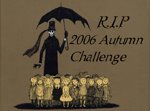Grange House
 Grange House
Grange House
Another entry in the Readers Imbibing Peril (R.I.P.) Autumn Challenge
Title: Grange House
Author: Sarah Blake (interview/article from December 2004 issue of the The American Online)
Copyright: 2000
Length: 378 pages ( link to the work on LibraryThing )
Genre: Gothic Fiction, Women's Fiction
Summary: Maisie Thomas visits the island with her loving parents every summer. At seventeen, she is just beginning to sense the constraints placed on her in 1896 in a world where men and women have specific roles. This is a coming-of-age story, full of ambiguities and misunderstandings. Essentially, the question is will Maisie make the same mistakes as those who have gone before?
Eerie/Creepy Quotion: To borrow the phrase of M.R. James, this story is able to provide a delicious sense of unease in the reader, but it is not primarily either a ghost or horror story. It is in fact a true gothic novel (reminiscent in some ways of Jane Eyre without any of the same plot points) and so very compelling and well-written that one has to award it a 4 out of 5 on the eerie scale. I was most pleased to see that it could stand up to a second reading.
Extract:
There was a drop of wind suddenly, as though the world rushed away before turning to deliver one last mighty smack -- and just as the doctor and Nell Grange appeared in sight of the house, the first great towering flame shot straight up through the roof and into the sky. Nell screamed and threw herself down from the cart, running up the lawn. But another flame burst from the third-story windows, and the woman was pushed back from the house by the wave of heat. "Susannah!" Nell shouted, "Susannah!" The roar of the wind and fire was her only answer. [pg. 73]
Also Relevant: There are multiple triangles in this story -- tension between lovers, families, women. There are multiple narratives in this story -- letters, diaries, oral reminiscences -- presenting multiple points of view, each pov needing to be fitted into the life puzzle that Maisie Thomas is trying to work out. Of course, no one is quite as they seem. Families are ripped to pieces yet remain painfully chained. Is there madness in the household? Is there murder? The pace of the storytelling is slow; the reader, however, would be well-advised not to speed ahead. The novel is carefully constructed, deliberately furtive, and the author's meaning is uncovered little by little in each lengthy chapter. The point of the novel is Maisie's own navigation in discovering who she really is and what she wants of life. Just as in real life, that process unfolds in fits and spurts of action with time for reflection in between. It's superb writing.